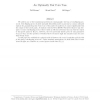Free Online Productivity Tools
i2Speak
i2Symbol
i2OCR
iTex2Img
iWeb2Print
iWeb2Shot
i2Type
iPdf2Split
iPdf2Merge
i2Bopomofo
i2Arabic
i2Style
i2Image
i2PDF
iLatex2Rtf
Sci2ools
106
click to vote
TCC
2009
Springer
2009
Springer
An Optimally Fair Coin Toss
We address one of the foundational problems in cryptography: the bias of coin-flipping protocols. Coin-flipping protocols allow mutually distrustful parties to generate a common unbiased random bit, guaranteeing that even if one of the parties is malicious, it cannot significantly bias the output of the honest party. A classical result by Cleve [STOC '86] showed that for any twoparty r-round coin-flipping protocol there exists an efficient adversary that can bias the output of the honest party by (1/r). However, the best previously known protocol only guarantees O(1/ r) bias, and the question of whether Cleve's bound is tight has remained open for more than twenty years. In this paper we establish the optimal trade-off between the round complexity and the bias of two-party coin-flipping protocols. Under standard assumptions, we show that Cleve's lower bound is tight: we construct an r-round protocol with bias O(1/r). Department of Computer Science and Applied Mathemat...
Cryptography | Honest Party | Kleeman Professorial Chair | TCC 2009 | Two-party Coin-flipping Protocols |
Related Content
| Added | 25 Nov 2009 |
| Updated | 25 Nov 2009 |
| Type | Conference |
| Year | 2009 |
| Where | TCC |
| Authors | Tal Moran, Moni Naor, Gil Segev |
Comments (0)

